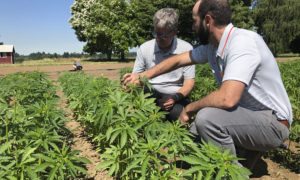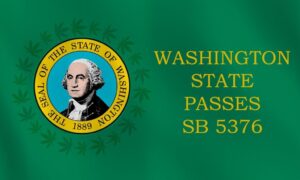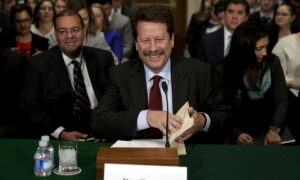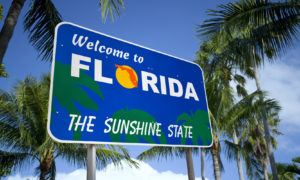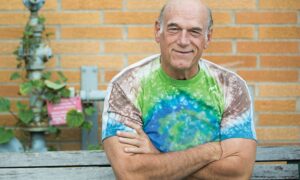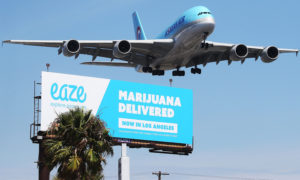Since medical marijuana officially became legal in Florida on Jan. 3, more than 650 patients have visited the Compassionate Cannabis Clinic in Venice to see if the treatment is right for them.

Patrick Deluca is executive director of the Compassionate Cannabis Care Clinic in Venice FL. [Herald-Staff Tribune staff photos / Mike Lang]
Since medical marijuana officially became legal in Florida on Jan. 3, more than 650 patients have visited the Compassionate Cannabis Clinic in Venice to see if the treatment is right for them.
Many of the patients are extremely sick, with conditions such as cancer, Parkinson’s disease and HIV. Roughly 20 percent are disabled veterans. Their average age is 54. And they’ve been getting relief.
As Florida lawmakers contemplate revisiting the medical marijuana issue in a special legislative session and revive a failed effort to establish regulatory guidelines for the voter-approved industry, a system for accessing the treatment already is taking shape.
A number of growers — licensed under an earlier program that authorized low-potency marijuana for seizure patients — already are harvesting and distributing full-strength batches of the drug, dispensaries are popping up across the state, home delivery is in full swing and patients are receiving treatments.
“We do have a functioning program,” said Compassionate Cannabis Clinic Executive Director Patrick DeLuca, adding: “Every day we’re hearing from patients who are getting their medicine and the response we’re hearing from patients is incredible.”
But there are concerns about how the system is working, from the limited number of companies licensed to participate to the fact that patients can’t buy smokeable forms of marijuana. Any consensus bill adopted by the Legislature almost certainly won’t allow smoking and likely won’t significantly overhaul the licensing system.
If the Legislature fails to act, the Florida Department of Health will establish rules for the industry later this summer. The department is likely to adopt many of the same restrictions that are opposed by marijuana activists and industry insiders.
That has DeLuca and others predicting legal challenges, which means the final framework for Florida’s medical marijuana system ultimately could be shaped by a series of court decisions, not necessarily what happens in Tallahassee.
“The only hope we’ve got” is the courts, said Bob Jordan, a marijuana activist from Parrish who has been lobbying the Legislature for years. “It’s going to be good for the lawyers.”
Meanwhile, one of the largest medical marijuana markets in the world is slowing taking root.
Busy clinic
The vanguard of Florida’s medical marijuana industry is being led by two Ohio transplants.
DeLuca is a former radio broadcaster from Akron who often used his time on the airwaves to advocate for medical marijuana. He partnered with Dr. Barry Gordon, an Ohio State University graduate and former emergency room physician, and opened the Compassionate Cannabis Clinic earlier this year.
Last week, the clinic saw 76 patients over four days.
“We’re booked pretty solid and we have been,” DeLuca said. “There’s definitely a demand. There’s definitely a need.”
DeLuca believes the clinic is the largest “brick and mortar” operation in Florida focused exclusively on medical marijuana. After five months of operation, DeLuca and Gordon have a good understanding of how the medical marijuana system is unfolding in Florida. It’s been ramping up quickly.
When Florida’s medical marijuana constitutional amendment — approved last year by 71.3 percent of voters — went into effect on Jan. 3, there were roughly 9,000 people registered to receive treatments under earlier marijuana programs approved for seizure victims and the terminally ill.
The state now has more than 22,000 patients in its medical marijuana registry.
Florida currently requires that patients have a 90-day relationship with their doctor before receiving medical marijuana. That means patients that the Compassionate Cannabis Clinic first saw on Jan. 3 began receiving the drug in April.
The Department of Health has been issuing medical marijuana ID cards to these patients, who must send a $75 check and 2-by-2-inch passport photo.
DeLuca recently saw one of the ID cards for the first time.
The entire system is “a little backwards and the kinks haven’t been ironed out yet,” DeLuca said, but so far patients are just happy to be accessing the treatment.
Home delivery of the drug has been important because few dispensaries have opened. Sarasota and Manatee counties do not have any dispensaries yet. Some local communities have enacted temporary moratoriums on opening dispensaries in order to establish zoning regulations.
Right now, access to the drug is limited because the industry is in its infancy. But even when the industry starts to grow, many believe the current system — which awards a limited number of business licenses — will make the treatment harder to access and less affordable.
Golden tickets
Todd Beckwith has been closely watching the legislative debate over medical marijuana in Florida.
Beckwith is the marketing director for AltMed, a Sarasota-based medical marijuana company that operates mostly in Arizona.
Link – Herald Tribune



